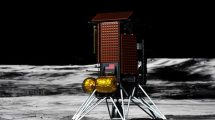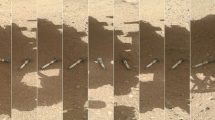 Mohammed bin Rashid Al Maktoum, Vice President and Prime Minister of UAE and Ruler of Dubai, and Mohamed bin Zayed Al Nahyan, Crown Prince of Abu Dhabi and Deputy Supreme Commander of the UAE Armed Forces, has reviewed the final preparations of the Emirates Mars Mission team as the Hope probe is a few days away from arriving to Mars’ orbit in the first-ever Arab interplanetary mission.
Mohammed bin Rashid Al Maktoum, Vice President and Prime Minister of UAE and Ruler of Dubai, and Mohamed bin Zayed Al Nahyan, Crown Prince of Abu Dhabi and Deputy Supreme Commander of the UAE Armed Forces, has reviewed the final preparations of the Emirates Mars Mission team as the Hope probe is a few days away from arriving to Mars’ orbit in the first-ever Arab interplanetary mission.
In a meeting where both leaders discussed a number of strategic and national plans, Sarah Al Amiri, Minister of State for Advanced Technology and Chairperson of the UAE Space Agency, presented the last stages of the Hope probe’s journey, leading up to its expected arrival to the Red Planet’s orbit on Tuesday, February 9, 2021 at 7:42 PM UAE timing.
The probe’s successful arrival to Mars will make the UAE the fifth nation in the world to reach the Red Planet after the United States, Soviet Union, China, the European Space Agency and India, and the third to make the feat from the first attempt. Besides the UAE’s Hope probe, China and US are leading exploration missions set to reach the Red Planet this month.
During the meeting, Mohammed bin Rashid Al Maktoum said: “We are 9 days away from making history with our arrival to Mars. The UAE has led the Arab world to new frontiers in deep space for the first time in history. Our space mission carries a message of hope and confidence in Arab youth.”
He stressed that “The probe has a 50% chance of successfully entering Mars’ orbit, but we have achieved 90% of our goals behind this historic project.”
Mohamed bin Zayed Al Nahyan said: “The Emirates Mars Mission embodies the aspirations that distinguish your country and reflects our leading status in the Arab and Islamic world. Through our journey to Mars, we will explore new horizons towards a better future.”
He added: “The UAE’s arrival to Mars was the dream of the late UAE founder Zayed bin Sultan Al Nahyan. Our investment in human capital proved worthwhile as we see our youth capable of reaching the stars. We are proud of our people and we look forward to making a historic contribution to serve humanity.”
The Hope probe’s complex manoeuvre on February 9 will be the most critical part of the mission that will see the spacecraft rapidly reducing its speed from 121,000km/h to 18,000km/h to enter Mars’ orbit.
Upon arriving at Mars after travelling 493 million kilometres in a seven-month journey since its launch on July 20, 2020, from Tanegashima Island in Japan, the probe will provide the first-ever complete picture of the Martian atmosphere.
The unmanned spacecraft will explore the climactic dynamics of the Red Planet in daily and seasonal timescales for a full Martian year (687 earth days), an endeavour that has never been pursued by any previous mission.
Since its launch on a Mitsubishi MH-IIA rocket, the Hope probe has completed the launch and early operation stages, two of the six stages of its journey. The spacecraft is approaching the end of the third and longest stage, the cruise, which saw three successful manoeuvres to keep the probe on track towards its Mars destination.
On February 9, 2021, the probe will enter the fourth and most critical stage of its journey, the Mars Orbit Insertion (MOI), which involves firing six Delta V thrusters to rapidly reduce the speed of the spacecraft from 121,000 km/h to 18,000 km/h to enter Mars’ orbit. The following two stages, the ‘transition to the Science Orbit’ and the ‘Science Orbit’ will see the probe carrying out its exploration mission to study the atmospheric dynamics and weather of the Red Planet.
Once it reaches Mars’ orbit, the Hope probe will provide the first-ever complete picture of the Martian atmosphere, monitoring weather changes throughout the day during all seasons, which has not been done by any previous mission.
Exploring connections between today’s Martian weather and the ancient climate of the Red Planet will give deeper insights into the past and future of Earth and the potential of life on Mars and other distant planets.
The probe will gather and send back 1,000 GB of new Mars data to the Science Data Centre in the UAE via different ground stations spread around the world.
The Mohammed bin Rashid Space Centre immediately began the project’s implementation, forming teams of young engineers, scientists and researchers to carry out the historic national mission in only six years to coincide with the UAE’s 50th-anniversary celebrations in 2021, half the duration of conventional missions to Mars that normally take 10-12 years to implement.












Add Comment